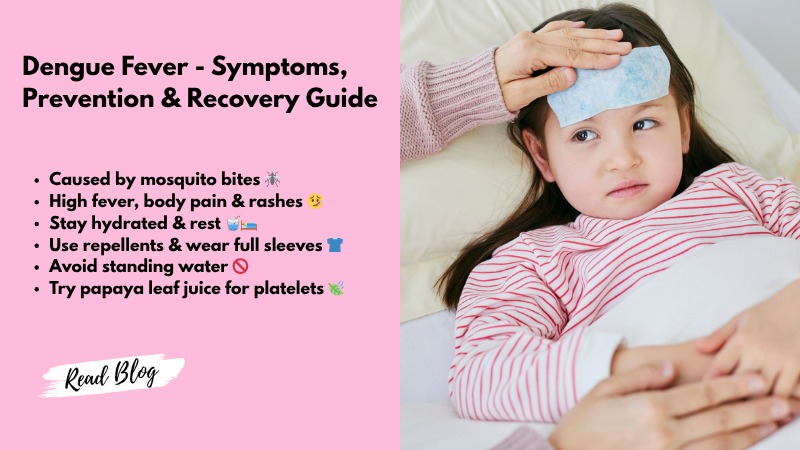Dengue Fever: Symptoms, Prevention & Recovery Guide
Aug 06, 2025
Dengue is a viral infection caused by the dengue virus, transmitted through the bite of an infected Aedes mosquito. With increasing urbanization, stagnant water, and warmer climates, dengue has become a recurring seasonal health threat—especially in tropical countries like India.
Let’s explore how to recognize the signs, prevent infection, and support recovery.
What is Dengue?
Dengue is a mosquito-borne illness caused by four types of dengue virus (DENV-1 to DENV-4). Once infected, the body builds lifelong immunity to that specific virus type, but subsequent infections with different types can increase the risk of severe complications.
Common Symptoms of Dengue
Symptoms usually begin 4–10 days after the mosquito bite. These include:
- Sudden high fever (up to 104°F or 40°C)
- Severe headache, pain behind the eyes
- Muscle, joint, or bone pain (“breakbone fever”)
- Nausea, vomiting
- Skin rashes (typically 2–5 days after fever starts)
- Fatigue and weakness
In some cases, Dengue can become severe, leading to Dengue Hemorrhagic Fever (DHF) or Dengue Shock Syndrome (DSS), which can be life-threatening.
Warning Signs of Severe Dengue
Seek immediate medical help if any of these appear:
- Bleeding gums or nose
- Blood in vomit or stool
- Difficulty breathing
- Persistent vomiting
- Abdominal pain or tenderness
- Extreme fatigue or restlessness
How to Prevent Dengue
The best protection is mosquito control and bite prevention:
- Use Mosquito Repellents with DEET, picaridin, or oil of lemon eucalyptus.
- Wear long-sleeved clothing and full-length pants outdoors.
- Sleep under mosquito nets, especially during daytime naps.
- Eliminate standing water in flower pots, coolers, plant trays, and open containers.
- Use mesh screens on windows and doors.
Nutrition & Hydration During Recovery
While there's no specific antiviral treatment for dengue, supportive care is essential.
- Hydration is key: Drink water, oral rehydration solutions (ORS), coconut water, and fresh juices.
- Eat light, nutritious food: Soft khichdi, fruits like papaya, kiwi, and pomegranate help recovery.
- Avoid painkillers like ibuprofen or aspirin as they can increase bleeding risk. Paracetamol is safer.
Home Remedies (Supportive Only)
Though not a cure, some people use these remedies to support platelet count and energy levels:
- Papaya leaf juice – traditionally used to boost platelet count.
- Giloy juice – believed to strengthen immunity.
- Turmeric milk – for overall healing.
(Always consult a doctor before using home remedies.)
Role of Supplements & Immune Support
During and after dengue, the immune system can remain weak. Supplements can support faster recovery:
- Vitamin C & Zinc: for immune repair
- Multivitamins: to restore nutritional balance
- Iron & Folic acid: to recover from blood loss or fatigue
When to See a Doctor
Always consult a healthcare provider for proper diagnosis and treatment. A blood test to check for NS1 antigen or IgM antibodies is used to confirm dengue.
Final Thoughts
Dengue is preventable and manageable with awareness, timely care, and a healthy recovery plan. Staying informed and taking basic precautions can protect your family and community from this recurring monsoon menace.
Trusted Healthcare Support from Steris Healthcare Pvt Ltd
For immune support, pain relief, and nutritional recovery during and after dengue, Steris Healthcare Pvt Ltd offers a wide range of high-quality products:
- Sterimmune CDZ – Multivitamin with Zinc & Vitamin C
- Metapect PCM – Paracetamol for fever and pain
- Diclosteris Spray – For body pain and joint ache
- Conaris 100 – For general weakness and post-viral fatigue
Stay safe, stay strong, and trust Steris Healthcare Pvt Ltd for reliable healthcare solutions.
Recent Post

Trazodone Hydrochloride 100 mg and 50 mg Tablets for Depression

Baclofen Tablet | Uses, Dosage, Side Effects & Benefits

How Remogliflozin 100 mg Helps Lower Blood Sugar & Aid Weight Loss

Antioxidant Therapy in Chronic Conditions: Clinical Value of STYLECYSTIN ENDO

rosuvastatin ezetimibe tablet : uses, benefits, dosage, side effects

How Citicoline and Piracetam Work Together for Brain Power

How to Apply Clindamycin Nicotinamide Gel Correctly

Best Keratin and Biotin Shampoo for Men & Women | DANDROPHYTE

How Ferric Pyrophosphate Syrup Boosts Hemoglobin Faster Than Regular Iron

Tedizolid Phosphate 200 mg: A Potent Option for Resistant Skin Infections

